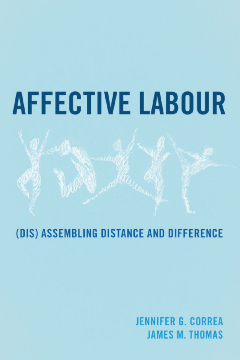
Additional Information
Book Details
Abstract
Affective Labour explores four distinct landscapes in order to demonstrate how collective feelings are organized by social actors in order to both reproduce and contest hegemony. Utilizing a variety of methods, including participant observation, in-depth interviews across field sites, and content analysis of mass media, Correa and Thomas demonstrate the centrality of affective labor in enabling and constraining prevailing norms and practices of race, citizenship, class, gender, and sexuality across multiple spatial contexts: the U.S.- Mexico border, urban nightlife districts, American college campuses, and emergent social movements against the police state.
The book demonstrates how the power of affective labour might be harnessed for progressively oriented world-building projects, including what the authors term an ‘affective labour from below.’ By tying an analysis of affective labour into movements for social justice, the authors aim to produce a critical theory of the world that can be practically applied.
In this theoretically groundbreaking yet remarkably accessible book, Thomas and Correa establish a strong case for why affect should matter to scholars of race and racism, as well as to activists working for social justice. Affective Labour describes the painstaking work of identification, the crafting of difference, and the production of social distance, in effect asking how forms of violence and exclusion become imaginable or unimaginable. The book takes the reader on an intellectual journey from a college-town bar scene to the US-Mexico border, through the contemporary diversity regimes of predominantly white institutions. The authors then bring the lessons from these case studies to bear on the emergent affective politics of Black Lives Matter and similar radical democratic social movements. In spite of the grimly neoliberal landscapes of difference and inequality it explores, Affective Labour remains optimistic in its evocation of coming into being and the potential for an affect of liberation in progressive politics.
Rebecca R. Scott, Associate Professor of Sociology, University of Missouri-Columbia
Thomas and Correa’s expansive research into distance and difference takes us on an immersive journey into configurations of affective subjectivity - from above and below. Carefully crafted case studies of urban nightlife in Columbia, Missouri, ‘War on Terror’ at the US-Mexico border, diversity regimes in higher education, and the #BlackLivesMatter Movement, underline why affect should be of critical concern to social, cultural and political theorists. Affective Labour is an original and timely contribution that will have implications for how we approach the politics of difference in the classroom, the polity and on the street.
Christopher Kyriakides, Associate Professor of Sociology, York University, Canada
Bringing together critical social, cultural and political analysis, phenomenology and original ethnographic research, this book is a must read for anyone interested in the politics of affect. Thomas and Correa provide an imaginative and incisive account of how the manufacturing of gendered, racialised, sexualised, and classed relations of distance and difference is a matter of affective labour. Through a diverse range of in depth examples - from American nightlife cultures, to University diversity-initiatives, to the #BlackLivesMatter movement - the book offers a refreshing and distinctive examination of the affective work of everyday life and its wider critical implications. The analysis offered is at once productively troubling and optimistic: Contemporary forms of affective labour frequently work to reproduce relations of domination, but they also fuel solidarity, resistance and ‘a sense of hope for what can be, despite the reality of what is’.
Carolyn Pedwell, Senior Lecturer in Cultural Studies/Cultural Sociology, University of Kent
Thomas and Correa offer an important empirical study of affective labor’s central role in sustaining two pillars of inequality: racial difference and socio-spatial distance. Noteworthy for its comparative and relational approaches, Affective Labour reveals the entwinements between racism and affect in everyday practices and places.
Paula Ioanide, Associate Professor of Comparative Race and Ethnicity Studies, Ithaca College
James M. Thomas is an Assistant Professor in the Department of Sociology and Anthropology at the University of Mississippi.
Jennifer G. Correa is Assistant Professor in the Department of Sociology and Anthropology at the University of Wisconsin.
